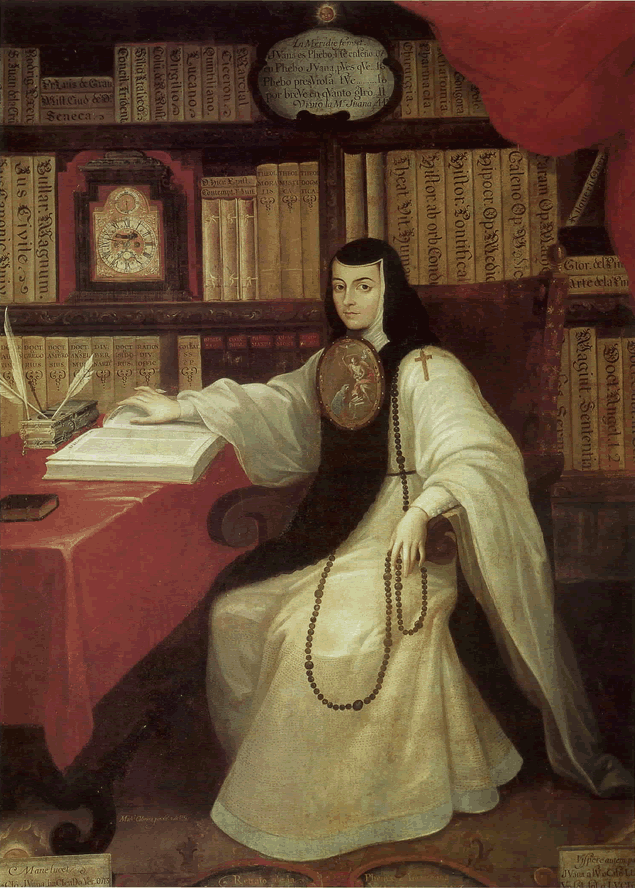 Sor Juana by Miguel Cabrera.
Sor Juana by Miguel Cabrera.Click here for our first post about Sor Juana: Who is the Tenth Muse?
Tanya Saracho’s The Tenth Muse takes place in the midst of Colonial Mexico, where the violence of the Spanish Inquisition and the threat of plague silently loom overhead. Dominated by Spain and European ideals, Colonial Mexico was fixed to a rigid Catholicism that was more conservative than that which existed in the motherland. Here, the morals of the New World were forged through blood and disease. The conquerors and the Church worked hand in hand to censor culture, art, music, and any other form of dissent which they saw fit. Although they succeeded in controlling people through domination, it was impossible to make Colonial Mexico into a true image of Spain.
Saracho’s play takes place just 20 years after Sor Juana’s death. Within the convent, the nuns’ and servants’ personal desires for education and art clash with the moralizing and violent threats of the Church and the Inquisition. As the servants uncover Sor Juana’s plays, their minds are enriched in a way the bible alone cannot reproduce. Her work brings them more than joy, rather it creates empathy and connection between women who are completely different from one another. But joy and knowledge are precious things, and the convent’s Mother Superior threatens to eradicate Sor Juana’s writings once and for all.
Many of the play’s central elements mirror the problems that Sor Juana faced in real life. Sor Juana was hardly your average nun! She wrote openly, provocatively, and fearlessly. How many nuns write erotic love poems?
“Being a woman, being elsewhere: these cannot hinder my love for you, for who knows better that our souls know neither geography nor sex”
Obras completas, poem 19
How many challenged misogyny?
“No woman wins esteem of you: the most modest is ungrateful if she refuses to admit you; yet if she does, she’s loose.”
You foolish men
How many advocate for the rights of women in Colonial Mexico?
“God Almighty knows why and for what purpose. And he knows I’ve asked him to snuff out the light of my mind and leave only what’s necessary to keep his commandments. Some would say that any more is too much in a woman, and some even say that it is harmful. The Almighty also knows that, since my request failed, I have tried to bury my intellect along with my name and to sacrifice all this only to the one who gave it to me.”
La Respuesta a Sor Filotea
Make no mistake, the Church wasn’t too happy with her. These radical themes were upsetting to the Church and their officials. But, much of her work was commissioned by the Viceroyals. In fact, her fame in the Spanish speaking world can be credited to the protection and support of the Viceroyals. But, Sor Juana was left vulnerable when the Viceroys left Colonial Mexico.
Like Icarus who flew too close to the sun, Sor Juana inevitably met her downfall. She was fearless in the face of oppression. That fearlessness made her stick out like a sore thumb. After her critique of a well respected Jesuit sermon was published, the Church threw the hammer down on Sor Juana and reprimanded her for stepping out.
Unexpectedly, she responded fearlessly. She wrote “La Respuesta a Sor Filotea” which was quoted above. She logically reasoned why women deserve the right to an education and did not back down from her own intelligence. In fact, she used the bible to aid her argument. Regardless of how clever she was, she was fighting a losing battle.
Pressure inside the convent and directly from Church superiors forced her to renounce her once famous library. Still, she protested. Sor Juana would study even as her superiors told her not to. They took away her books but she found solace in her own mind, which held a vast amount of information. When the Church felt they could no longer control her, they opposed a forced silence on Sor Juana; she never spoke or wrote again.
At the end of her life, Sor Juana was a shadow of her former self. The institution tried to eradicate and burn much of her writing. Thankfully, the Vicereine preserved some of Sor Juana’s works in her personal library. Almost inevitably, the plague took her life when she was aiding her sisters during an epidemic. She died silent, and alone.
The “Tenth Muse” is but one nickname for Sor Juana. She is commonly called “the Phoenix”. The Church tried to bury her, but like the phoenix Sor Juana’s art rose from the ashes. Her words have influenced people of her time and certainly across time.
Inspired by the life of Sor Juana, Tanya Saracho’s play balances the elements of art, censorship, and personal freedom in the face of tyrannical oppression. The play, The Tenth Muse demonstrates the transformative power that art has on the human experience and illuminates the power of Sor Juana.
Catch some of Sor Juana’s magic this summer at the Davis Shakespeare Festival’s 2019 production of the Tenth Muse!
By Mia Tapnio for Davis Shakespeare Festival
April 30, 2019
Sources:
https://www.latimes.com/archives/la-xpm-1997-jul-06-bk-10005-story.html
www.jstor.org/stable/23022527